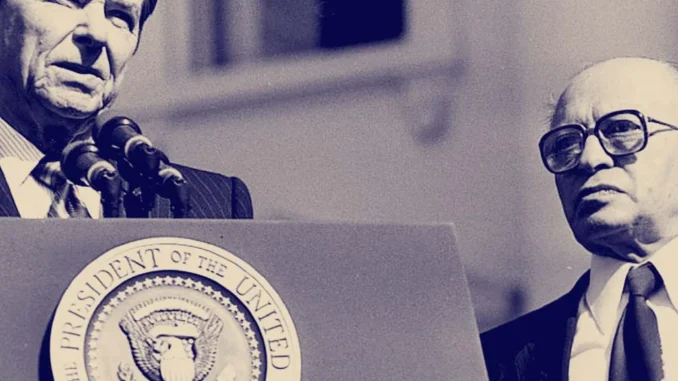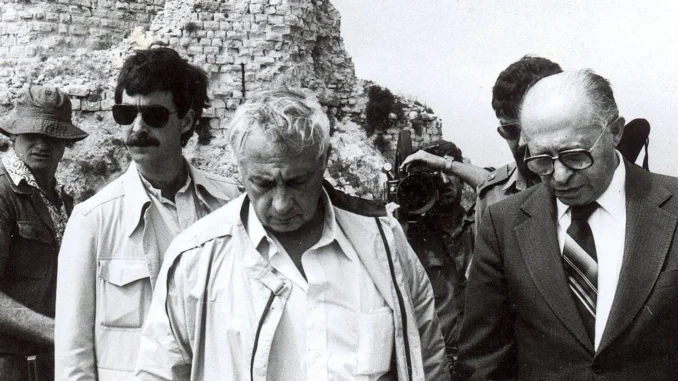T. Belman. This title is very misleading because what was discussed was the “problem” of the Palestinian refugees in Lebanon. Begin proposed that the Palestinians in Lebanon be transferred to other countries. No where in this report is there mention of “expelling”. Remember that the Arab League committed themselves to preventing the resettlement of any Palestinian refugees. They want them kept in limbo so as to apply pressure on Israel to take them back.

Ronald Reagan and Menachem Begin outside the White House in 1981.Credit: Yaakov Saar/GPO
Two weeks after the outbreak of the First Lebanon War, which Israel embarked upon 40 years ago this month, Prime Minister Menachem Begin and U.S. President Ronald Reagan met in Washington.
Among the items on the agenda: the need to find a “final solution” to the “problem” of the Palestinian refugees in Lebanon. The Americans agreed that Israel had a right to take action against the PLO (Palestine Liberation Organization), which had entrenched itself in Lebanon after being expelled from Jordan in the 1970s, and used it as a base to launch attacks within Israel.
Reagan wonders: ‘Could there be any answer until the final solution to the problem is found?’
But they were critical of the intensity of Israel’s fighting and concerned about the hundreds of thousands of Palestinians who had been living as refugees in Lebanon since they either fled or were expelled from Israel in 1948.
Begin replies: ‘A solution could be found if there is a will to find it’
This discussion took place on June 21, 1982 at the White House. The English transcript was recently scanned and uploaded to the Israel State Archives site as part of a file of hundreds of pages of documents recording the conversations between Israel and the U.S. about the First Lebanon War. Some of the documents in the file have been previously published, but the full file was unveiled at the behest of former chief archivist Yaacov Lozowick, for a research project he conducted at New York University’s Taub Center for Israel Studies.
In the transcript, Reagan first considers the possibility that the Palestinian refugees in Lebanon would assimilate into local society and become Lebanese citizens. “Would the bulk of those Palestinians (not PLO), would not they, if they were told by the government of Lebanon, that they could become legitimate citizens, would that not be a solution? They are, after all, in every other Arab country,” Reagan asks. A little later, he says, “I understood… that those who want to become part of Lebanese society would be welcome to do so.”

Begin and Sharon after the battle at Beaufort, in June 1982.Credit: IDF Spokesperson’s Office/GPO
Israel’s Ambassador to the UN, Yehuda Blum, replies, “In Lebanon there is also a problem of the religious balance that could be upset by granting the refugees permanent status,” since most Palestinians are Muslims. “I could see why Lebanon would be reluctant to admit them permanently,” he said.
Begin responds that there were between 350,000 and 400,000 Palestinian refugees in Lebanon, of whom 15,000-20,000 were “organized terrorists with heavy equipment.” Referring to the refugees, he says, “At least part should leave Lebanon… It is a small country.” He suggested sending them to other Arab countries. “Libya claims to be a friend of the PLO. It is a large country. So why should not they take people in? Iraq is a huge country with vast resources – water and oil – why should they not go there?” Begin says. “Iraq is empty, Syria is empty,” he says later on. Israeli Defense Minister Moshe Arens interjects: “It is unfortunate that some of the Arab countries have not been ready to absorb a significant number (of refugees). Saudi Arabia, Syria and others could well have done so.”
Reagan wonders: “Could there be any answer until the final solution to the problem is found?” Begin replies: “A solution could be found if there is a will to find it.” He repeats his proposal that the Palestinians in Lebanon be transferred to other countries. “The Arab countries have vast territories, much water, oil and billions of dollars,” he says.
Begin later cites other refugee crises in history to bolster his argument that “resettlement” was the answer, mentioning among others the millions of ethnic Germans from western Poland who became refugees at the end of World War II and were resettled in Germany. “Resettlement is the normal and human way of resolving refugee problems,” he says, noting that this was what was done in the case of Pakistan and India, Turkey and Greece “and all the others.”
- Why Israel Wanted America to Start a War With Saudi Arabia
- Lebanon War, 40 years on: The conflict that changed Israel
Begin also brings up the Jews from Arab countries who resettled in Israel after they fled, were expelled or chose to leave their countries in and after the war of 1948. “We took in 800,000 Jews from Arab countries,” he says. “They are good, loyal, hardworking citizens.”
Toward the end of the discussion, Reagan asks a question that goes unanswered: “Did anyone stop to ask those Palestinian people?”
“The war started”
On June 5, 1982, the Israeli government decided to go to war. The decision read as follows: “To charge the IDF with the mission of removing all the northern communities from the range of fire of the terrorists whose command centers and bases are concentrated in Lebanon.” The goal set by government decision makers was to seize the territory up to 40 kilometers north of Israel’s border with Lebanon.
The war began the next day. Officially, the objective was to launch an operation that was limited in time and scope, whose purpose was to get rid of the organizations that had been firing Katyusha rockets at northern Israeli communities and had set out from Lebanon to commit deadly attacks on civilians inside Israel. The 40-kilometer line was of great importance. On June 6, Begin repeated it in a letter he sent to Reagan. On June 8, Begin also announced at a session of the Knesset that Israel would stop the fighting once it pushed the PLO 40 kilometers away from the border.
However, the war did not stop at the 40-kilometer mark, but continued all the way to Beirut, with Israel seizing control of nearly half of Lebanon. The deviation from the 40-kilometer plan was the main cause of the public debate over the war, of U.S. criticism of Israel, and domestic criticism of the military in Israel.
Most of the criticism was ultimately directed at Defense Minister Ariel Sharon for having allegedly planned from the outset to embark on a much more ambitious war in which the real goal was to obtain a new political order in Lebanon in which the Christians, considered more “convenient” for Israel, would seize power after Beirut was conquered. His critics argued that he essentially misled the cabinet, the Knesset and the public.
An interesting reference to this issue is found on the first page of the transcript from the June 1982 White House meeting. At the start of the discussion, Begin asks Maj. Gen. Yehoshua Sagui, head of the military’s intelligence branch, to make a presentation on the war. In his remarks, Sagui contradicts the official stance that Israel originally planned to stop at the 40-kilometer mark and was forced to expand the war as the fighting evolved.
“The war started… with the intention to remove the range of the Katyushas from our border area. We did not consider the 40km line as the ultimate line,” Sagui says, explaining that the PLO guns, “when deployed on the [Golan] Heights, reach a range of 50-55 kilometers.” By the time of this meeting, this point was basically moot, since Israel had already went far beyond the line days earlier, as Reagan complained in a letter to Begin on June 9.
During the discussion, Begin justifies the war by citing deadly attacks on civilians committed by Palestinians who crossed into Israel from Lebanon in the 1970s, including the Ma’alot attack that killed 31 Israelis in 1974, the 1979 attack in Nahariya that killed two small children and two other Israelis, and the Coastal Road attack on a crowded bus in 1978 that killed 38 Israelis, including 13 children.
Begin accuses the Soviet Union of arming the Palestinians in Lebanon and said there was no doubt it had “turned Lebanon as a base of its armaments in the Middle East” and that Israel was stunned by the quantities of Soviet arms it found in Lebanon. “We found 10 times more weapons than our intelligence had predicted… All in all, in Lebanon we found weapons of Soviet origin of such a quantity that it will take six weeks to remove, using 10 huge Mack trucks, working day and night,” he says.
Regarding the rockets, Begin tells the Americans: “Since they got the long-range weapons from the Soviet Union… those rockets are threatening the whole finger of Galilee… They kept our civilians in Galilee hostage… Throughout all those times our people lived with the permanent fear of sudden death.”
Begin emphasizes the fear brought by the rockets and references World War II, when the Russians used Katyushas against the Germans, saying that “in Stalingrad the Germans feared the Katyushas more than anything else.” He goes on to say, “One who has not had the experience of Katyushas cannot understand the terror. There is a whistle and then a sudden explosion.”
Begin also states that tens of thousands of Israelis in dozens of communities were being subjected to Katyusha attacks. “They cried out to us – put an end to it.” He also protests Reagan’s use of the word “invasion” to describe the entry into Lebanon: “To say that we ‘invaded’ Lebanon is an absolute misnomer. We went out to fight armed bands from a neighboring country attacking our people. This is the international rule of the inherent right of self-defense against aggression.” Begin also makes a point of telling the U.S. president that by going into Lebanon and finding the Soviet arms, Israel not only defended its people but “we also did a great service to the free world.”



WHAT PALESTINIANS?